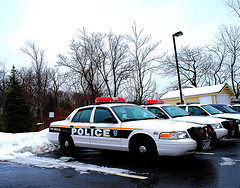Law Enforcement Advice on How to Deal with Offline and Suicide Threads on Your Community

Credit: Lee Cannon (CC BY-SA 2.0)
Brian Walker is a patrol deputy in Kansas, who has been working in law enforcement since 2006. Alex Embry is a sergeant in Illinois and a member of his department’s SWAT team, having been involved with law enforcement since 2004.
Both Alex and Brian also happen to be longtime moderators for me on KarateForums.com.
I found the connection very interesting and so we sat down to discuss their work, on the community that I manage, and off of it. In part one of the conversation, we discussed the similarities between both positions, being seen as more than just an enforcer, and judgement calls and officer discretion. For part two, we touched on the dark side of authority: abuse of power and corruption.
Finally, in this third and final part, Alex and Brian share advice on dealing with offline and suicide threats, from both the side of the community manager and the law enforcement official who might be called to help. We wrap up by reflecting on how being an officer has helped them be a better moderator – and how being a moderator has aided them in their job.
Offline and Suicide Threats
Patrick: I’d like to shift gears a bit. Community managers and moderators mostly deal with issues confined to their communities. But sometimes we face issues that need to go offline – or that we think might need to go offline.
There are situations where we may be threatened, and it’s tough because the line between a meaningless threat and a serious threat can be difficult to navigate. You don’t want to waste the time of law enforcement or feel like the boy who cried wolf. In other words, if the threat is meaningless, authorities may be less likely to take you seriously next time.
We may also fear for the safety of our members. For example, on KarateForums.com, we have an escalation policy for suicide threats. That policy includes contacting the member to encourage them to seek assistance, limiting the damage the wider community can cause to the situation and then contacting me immediately.
The ball is then in my court to quickly assess the situation and decide what to do. How much do we know about this person? Do we know their name? Where they live? Do we only have an IP address? How serious is the situation? Do I have enough information to call the police? An IP address just isn’t enough. And then I have read stories of people saying how they made a comment once when they were depressed, someone called the police and they were involuntary committed, which only made matters worse.
No matter the situation, police departments are generally taxed as it is, without receiving calls from a community manager in another county, state or even country, that only knows a few details and can’t even give you a specific address. How credible does that sound?
What are your thoughts on how community professionals should deal with these issues and interact with law enforcement? Do you have any experience with threats reported in this manner?
Alex: I think you have a solid policy here. I think it would be irresponsible to have an open community, encourage people to share and then do nothing if there was some indication of trouble. Even a non-specific threat is an indicator of potential problems. I also think that due to the nature of an online threat, you’d need specifics to direct law enforcement resources. Nothing is more irritating than being told to go look somewhere, for something, with no further information to go on.
I’ve had to deal with this, and it’s frustrating to all parties involved. Knocking on doors along an entire street looking for a person named “X” that might be thinking of harming themselves gets a negative reaction from the cops assigned and the public that you’re waking up at 3 AM.
That said, due to the highly evolving nature of electronic communication, we’ve had suicide threat responses via text, Facebook and other online media that led to good interventions based on what the reporting party was able to provide us.
I was involved with a specific case of a Facebook threat where other “friends” were able to provide residential information even though the initial caller didn’t have it. We responded and actually ended up cutting the victim down from where he had tried to hang himself. We ended up saving him. What’s even more remarkable, the roommate in the house with him had no idea that he was considering taking his life. Without the report from an online source, he would have woken up the next morning to find his roommate dead from a rafter in the basement. It was the online report that led us there to intervene. No source of information came from the actual residence.
So I do think it’s important, and responsible, to have some sort of policy in place. The community manager needs to consider passing this information along. That said, as specific information as possible needs to be included. This might mean that sometimes there’s nothing you can do. That’s a bummer to think of, but the reality of the situation.

Brian Walker
Brian: Like Alex mentioned, I think you have a good policy in place here to deal with suicide threats. That, along with the documentation policy you have, would provide help to law enforcement, should a situation like the one Alex described ever come down the pike.
Further, I think it is important for community professionals to make sure they have some kind of a plan in place for situations like this – for multiple reasons. Threats of a type other than suicide could pop up, and depending on the factors involved, some could be realized. For example, in an online community like KarateForums.com, it may be tough for members to actually get at each other, seeing as many of us are very spread out.
However, it isn’t that uncommon for members to get together, either. I’ve met you once, Patrick, and met with Robert Mitcham (sensei8 on the forums) on another occasion. So it can happen. I think what helps the most with law enforcement is the documentation process you have in place here, which can show how many times something like a threat has been made, to whom and how often these threats come from the same individual. This shows a pattern and helps give law enforcement more to go on.
The case that Alex referenced in regards to the individual posting on Facebook is becoming more commonplace. We get reports in our jurisdiction quite a bit of an individual that someone reports as being suicidal due to comments they’ve made on Facebook or via text messages. I think community professionals do have a duty to report something like that, if they can do so in an effective manner. An IP address is a start, at least. I don’t know if a community manager could request an address, or even at least a zip code, when signing new members up, but things like that could help narrow down a search. The “like us on Facebook” buttons can also be a help, as getting on Facebook and connecting to the page of a person making such a threat can help to narrow a search further. These little things can really help law enforcement in these circumstances.
Patrick: I’d like to go back to a part of what I said above that wasn’t addressed, which is the nature of threats online and how easy people make them. Those who manage online communities can receive a lot of threats. I’ve received my share. The vast majority are throwaway stuff. But sometimes things are more serious.
I have always heard people say that if you are scared for your personal safety, or that of your family, you should call the police. That sounds like a good general rule, but it’s kind of vague and will be different for everyone.
When considering the seriousness of an online threat, is there anything I should look for to determine the veracity of the threat? Are there any warning signs that might indicate a threat is serious enough to report to the police, rather than ignore?
Alex: Right, what I said in my last answer was very vague and not really helpful in decision making. That said, I hear this kind of advice given all the time. For that matter, in my younger days on the job, I’m pretty sure I said something similarly unhelpful.
The first (at least to me) warning sign that this is beyond just a stream of hot air is any indicator that the individual actually is in physical proximity (or appears to be.) This could be any online indicators from a stated residence to anything you might glean from behind the curtain (IP address, etc.). Threats made in conjunction with proximity should always be taken seriously. Plus, it means that cops will take it seriously. A call about someone half a country away will elicit next to no investigation. Someone who lives a suburb over will get at least a face-to-face visit.
Further, any indication he puts out that research has gone into his threat. Your location (beyond what is public on your sites), routine, contact info (residential) – these should all be taken seriously. Any contact via a medium that isn’t your site info is another major indicator. These are things you cannot ignore in my opinion. They indicate that he’s actually furthering steps to go through with his threat. Legally, this is a red flag. Lots of people run their mouths – the ones who start taking steps are the most dangerous.

Credit: elliott bledsoe (CC BY 2.0)
Brian: I agree with Alex’s assessment here. Another thing I would add is that if you receive more than one harassing message from the same individual over and over again, that could be a sign of something like stalking beginning to take place, even if it is just online. Again, the documentation system at KarateForums.com is the key. If you have a file of documented harassment or threats coming from the same person over time, it might be good to present the documentation to law enforcement, just as a preventative measure. Law enforcement can always document a case without there needing to be action taken or an arrest made. You can just state that you wanted to document the incidents in case something as simple as harassment starts to ratchet up to threat.
Like Alex said, with the nature of communication online, proximity is going to be the major factor in determining the ability to follow through with a threat of physical harm.
Just to reiterate, I think you biggest ally is documentation, and you do a good job of that, Patrick.
How Your Law Enforcement Training Has Made You a Better Moderator
Patrick: How has your training and work in law enforcement helped you as a moderator?
Brian: Learning how to recognize and see things and picking up on small details when investigating cases has transitioned into how I moderate. Attention to detail is important, and picking up on some subtleties helps me with moderating.
From there, after gathering the facts of the matter at hand, making the decision and following through with action is also a translation from work in law enforcement. We have to gather facts, determine what cause is there and then make a decision as to whether or not an infraction occurred, or a law was broken, and then take decisive action to deal with it. It’s a kind of mindset that translates well into being a moderator.
Alex: I agree with Brian on all of his points. There’s also a comfort level in taking enforcement action that comes with the job. After making decisions on the job, making the decisions here is much easier to pull the trigger on. Also, there’s a certain level of discretion that officers develop. In addition to being comfortable with taking action, they are also accustomed to understanding that there are times when restraint is the best course of action.
Last, we’re used to working within a chain of command. Patrick, when you make a decision that we as moderators might not have seen the same way, it’s really not personal. We understand that and don’t take it as such. We get that and fall in line. I think that people that aren’t used to that sort of thing have a tendency to take direction in less than accommodating fashion at times. Granted, this is a generalization, but it holds water from my experience.
All of those factors have given me benefits when it comes to acting as a moderator.
Brian: I agree with these points, as well.
How Being a Moderator Has Made You a Better Officer
Patrick: To flip that question around, how has your time as a moderator helped you in your career, if at all?

Alex Embry
Alex: Honestly, it has made me 100 percent more tech savvy than before! Seriously, even though I don’t do investigations and don’t have to deal with that aspect of computer work, almost every aspect of police work now functions around gathering information from a terminal. All the way from reporting, to route finding, to getting basic info from the State on an individual – it’s all computerized. We use all sorts of applications in law enforcement that a ton of cops are just behind on.
Being an active member of the forums, and more importantly working in a moderator role, you gain the comfort level of simply navigating software. For you, Patrick, this might seem so simple that it hardly bears mentioning in a conversation, but for a bunch of tech non-savvy cops, it can be a different language.
Brian: It has made me more aware of the things that can go on behind the scenes in internet communities. The documentation process that you keep here has given me ideas as to how one might try to track someone through the internet in the case of threats and the like. Social networks are such a big part of how society interacts now, and it’s important to have a handle on how to track things through it, if necessary. And with there being so many different uses for various apps and internet sites, it’s possible to link people with the sites they frequent. There are lots of people out there that use the web for good things. Unfortunately, there are lots of people out there who use the web for bad things, too. My time here as a KarateForums.com staff member has let me see the internet a little bit differently.
I also agree with Alex in the comfort level one gains in navigating different software. I’ve never really been a “tech savvy” person, but being able to navigate software and be comfortable with it, and explain it, helps in getting the necessary information to someone who does know more about it and can put it to use.
Patrick: Thank you both for joining me and for being so forthright and honest.
